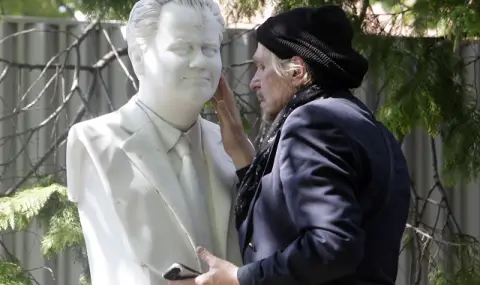The Kosovo War ended on 10 June 1999 after an unprecedented bombing of NATO vs. Serbia. The mission was undertaken without UN authorization and remains controversial to this day, although it ended the killings there.
On June 10, 1999, the Kosovo War ended. On that day, the UN Security Council adopted resolution 1244, which formally ended hostilities that had stopped the previous day.
Two and a half months earlier, on the evening of March 24, 1999, NATO launched its first bombing raids against targets in the remnant of Yugoslavia (consisting of Serbia and Montenegro). It was the first NATO combat mission without a UN mandate and the first involving German soldiers. This was a violation of a taboo: for NATO - because there was no mandate, and for the German public - because German soldiers were once again participating in war. NATO's goal was to force the Yugoslav army to withdraw from Kosovo in order to prevent the genocide and human rights violations of the Albanians living in Kosovo.
Backstory
The disintegration of Yugoslavia began in 1991 with the declaration of independence by Slovenia, Croatia and Macedonia. Bosnia followed in 1992. Serbia started wars against Slovenia, Croatia and Bosnia, only Macedonia was spared.
The signs of escalation in Kosovo were also a fact: already in 1989, the chairman of the Serbian Communist Party, Slobodan Milosevic, revoked the autonomy of the province of Kosovo. The exclusion of Albanians from the state administration and the public sector (health and education) in Kosovo had started even before this and only increased after the revocation of autonomy. For a long time, the Kosovo Albanians offered peaceful resistance, led by the writer Ibrahim Rugova, later the founder of the state and the first president of Kosovo.
Since the mid-1990s, however, the activity of supporters of the armed resistance against Serbia has increased. They organized themselves into the Kosovo Liberation Army (KLA) - initially a small unit, which in the second half of the 1990s reached the scale of a regular army.
The war before NATO bombing
Terrorist attacks on Serbian police stations followed, to which Belgrade responded with disproportionate firmness. The armed conflict spilled over in 1998/1999 into the initially intra-Yugoslav Kosovo War. And NATO's intervention was prompted by the discovery of the bodies of 40 murdered Kosovo Albanians in the village of Racak in January 1990. International observers declared that it was a mass murder, which the authorities in Belgrade disputed.
Rambouillet and the end of diplomacy
Peace negotiations were held in Rambouillet near Paris in February 1999 under the leadership of the Balkan Contact Group. These were the last diplomatic attempts by the Europeans and the US to push the Kosovo Albanians and Serbs to end the fighting with a treaty.
But the negotiations failed. The last attempt by the US special envoy Richard Holbrooke to persuade Milosevic to step down was also unsuccessful.
Controversies surrounding the missing UN mandate
In the run-up to the NATO airstrikes, Western politicians, and especially US President Bill Clinton, constantly accused Serbia of planning genocide in Kosovo. The alliance made no effort to obtain UN authorization because it would have faced opposition from Russia and China in the Security Council. For the German ruling coalition at the time, the decision to participate in the war with numerous combat aircraft was delicate - because of the conflicting reactions of pacifists and warmongers.
The so-called plan “Horseshoe" of Serbia, however, provided the German government with the necessary justification for German involvement in the Kosovo War. He envisioned the Albanian population of Kosovo being pushed across the southern border into Albania, but to this day there is no confirmation that such a plan actually existed. What is certain is that hundreds of thousands of Kosovo Albanians are fleeing or being driven out.
Milosevic gives in under pressure from Moscow?
The duration of NATO's war - over 11 weeks - was due to misjudgments on both sides, as most experts believe today. NATO is convinced that after a few days of bombing, Milosevic will show an inclination towards negotiations.
Expectations in Belgrade are that at some point NATO will give in and offer a compromise. In the end, Milosevic backed down, probably under Moscow's influence. Russia, which at that time was in a difficult economic situation, needed the cooperation with the West.
UN Resolution 1244 and the Kumanovo Agreement
The end of the war was settled by two international legal acts. The military agreement of Kumanovo on June 9, 1999 (on the territory of today's North Macedonia) provides for the withdrawal of the Yugoslav army and the Serbian police from Kosovo. From then on, the responsibility for security in the region rests in the hands of NATO. The agreement also provides for the disarmament of the Kosovo Liberation Army.
A day later, the UN Security Council voted on Resolution 1244, also known as the Kosovo Resolution. It contains the international legal basis for solving the crisis in Kosovo. Kosovo is intended to remain part of the Federal Republic of Yugoslavia, but with considerable autonomy. The UN also created a mission for a transitional administration, and parts of KFOR were sent to protect security. In the resolution, however, the final status of Kosovo remains open.
Independence of Kosovo
After 78 days, 2,300 airstrikes and around 3,500 casualties, the NATO intervention ends. This is the end of the Kosovo war, which started a year and a half earlier.
Nine years later, on February 17, 2008, Kosovo declared independence, which has since been recognized by 115 of the total 192 UN member states. Russia and China, as well as five EU countries - Greece, Romania, Spain, Slovakia and Cyprus - are not among them. Serbia still rejects the existence of Kosovo as an independent state.
